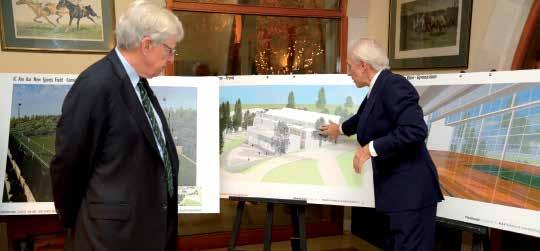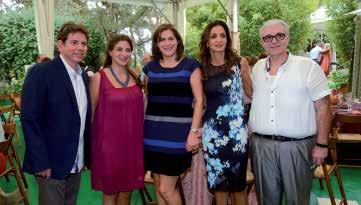
3 minute read
A Doctor and His ‘Patient’
A Doctor and is
At some point, they stopped being doctor and patient. Not even friends. Instead, something well beyond. So close, that the patient donated funds in his doctor’s name.
That is how the Dr. Ismail Khalil Auditorium at AUH came to be.
A few days after the dedication ceremony, Dr. Ismail Khalil ’64 sits modestly in his second floor office at the medical building.
“It’s very humbling,” he said. “It is the highest medallion of honor that can be bestowed on any professional in any field. It makes all the fatigue, the pain, the long hours in the operating room become a pleasure.”
The story begins in 1992 when an ill patient walked into the office of Khalil who had just been appointed Chairman of the Department of Surgery. The man had received the worst prognosis anyone could receive: he was about to lose his life.
Khalil, however, was able to save the patient’s life (the patient has asked to remain anonymous) and has been taking care of him medically since then.
Meanwhile, Khalil was making great strides in the world of vascular surgery and had become renowned for his dedication to his patients. In an effort to take vascular surgery even further in the country, he worked on establishing a laboratory at the hospital. Funds were solicited. Among the donors was none other than his ‘patient’. In June of 2012, the state-of-the-art Vascular Laboratory was dedicated perpetually in Khalil’s name, to become the “Ismail M. Khalil Vascular Laboratory.”
“There is no investment that would bear fruit in perpetuity like investing in the vision of academic research,” he said. “We will be producing better research, medical care and expanding on institutions that can accommodate more students who will be the leaders of the future.”
It was an exciting time.
And then the unthinkable happened. Khalil found himself clinging to life. In one of those horrid irreversible moments, a student accidentally struck Khalil with a needle during a surgery. The doctor contracted a viral infection which affected his liver. Khalil’s prognosis was bleak. A liver transplant was his only hope. Finally, a donor was located and Khalil was flown to the US for a transplant. As he desperately clung to life, his thoughts reverted to his patients – especially his friend.
“I learned what physicians don’t learn in medical school,” he said. “I learned the meaning of pain, empathy, being close to losing life and regaining it. Nothing makes you understand being a healer more than being ill yourself.”
And this time, it was the ‘patient’ who
Dr. Mohamed Sayegh , Dr. Ismail Khalil, Dr. Fadlo Khuri
was continuously checking up on his surgeon friend.
A year and a half later, Khalil had made a full recovery and returned to the American University of Beirut Medical Center (AUBMC) as a member of the senior administration – the Deputy Chief of Staff for Medical Services.
Shortly after, he heard the news. His ‘patient’ had contributed a generous sum to AUBMC and requested that the hospital’s auditorium be named after Khalil.
The surgeon was stunned.
“With every step I take, I remember you,” the patient told him. “You gave me the opportunity to continue living and you have been there for me throughout the years. Now I want to leave something for people to remember you with.”
On October 20, 2015, AUBMC celebrated the naming of the newly renovated, state-of-the-art SB 101 auditorium after Khalil.
As the surgeon walked up the stage to give his speech, he paused. Forty-five years ago, he was one of the first batch of students who had entered the auditorium. The road ahead then was still long. Many days were spent learning here. It was and remains to be a place of academic debates and medical conferences. And now, it was in his name. He was actually part of AUBMC’s history.
His eyes searched the audience and locked with one pair of eyes. The ‘patient’ smiled up at him. Khalil smiled back.
It had been a long journey for both. But they had arrived.












